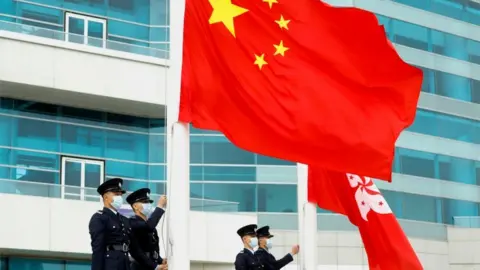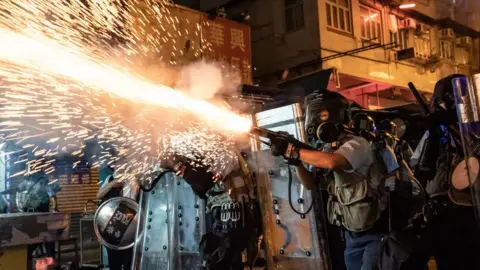Hong Kong electoral reform: LegCo passes 'patriots' law
 Reuters
ReutersHong Kong has passed a controversial electoral reform law, aimed at keeping people China deems "unpatriotic" from positions of political power.
The reform will allow a pro-China panel to vet and elect candidates, reducing democratic representation.
Critics warn it is designed to remove all opposition from the city's parliament, allowing Beijing to tighten its control over Hong Kong.
It is the latest measure designed to crack down on dissent in Hong Kong.
Since the electoral reform law was initiated by the Chinese government in March, it has drawn widespread international condemnation, including from the US, the EU and UK.
On Thursday the bill was passed by an overwhelming majority in Hong Kong's parliament, the Legislative Council (LegCo), which has been dominated by pro-Beijing lawmakers since a mass opposition walkout last year.
The bill will be signed into law soon by city executive Carrie Lam, who has said that the new vetting committee will not discriminate against people for their political views, but rather weed out any "non-patriots".
Over the past year a growing number of pro-democracy activists and politicians have been arrested under a separate national security law that came into effect last year.
What are the changes?
Candidates for Hong Kong's LegCo are to be nominated by the Election Committee, a powerful body which until now elected only the city's most senior official, the chief executive.
Any prospective MP, member of the Election Committee or candidate for chief executive will be vetted by a separate screening committee, making it easy to bar anyone deemed as being critical of Beijing.
There are also changes to LegCo itself, diluting the influence of directly elected MPs.
While overall seats will increase from 70 to 90, the number of directly elected representatives will fall from 35 to 20.
Forty seats will go to MPs chosen by the Election Committee, while 30 will be given to MPs elected by special interests such as business, banking and trade, which historically are also pro-Beijing.
What's the public opinion?
The authorities' crackdown on dissent has made it difficult to gauge what people in Hong Kong really think about the reforms.
Opposition politicians - those most directly affected by the change - were still speaking up when the changes were put forward by Beijing in April.
They will put Hong Kong "20 odd years back", Lo Kin-hei, chairman of the opposition Democratic Party, told the BBC, while another party member accused Beijing of "trampling on democracy".
Online influencer Penny Sun, however, told the BBC she fully backed the changes and that "Hong Kong will prosper and our lives will be more stable".
Lee Jonghyuk, an assistant professor at Singapore's Nanyang Technological University, said that sensitive topics of conversation would "naturally perish" under these kinds of circumstances.
"People will self-censor themselves, and this is intentional," he told the BBC.
What's the background?
The former British colony was handed back to China in 1997 under a model called "one country, two systems".
Under the deal, which gave the territory freedoms not available in mainland China, Hong Kong also had its own mini-constitution and an elected parliament.
These freedoms are enshrined in Hong Kong's mini-constitution, the Basic Law, which was meant to last until 2047.
But fears that this model was being eroded led to huge pro-democracy protests in 2019.
 Getty Images
Getty ImagesSome protests turned violent and last year, Beijing passed a controversial national security law, which effectively reduces Hong Kong's autonomy and made it easier to punish demonstrators.
The UK government said on Thursday that 34,000 people from Hong Kong had applied for British National Overseas visas following China's imposition of the national security law.
In March this year, the "patriots governing Hong Kong" resolution was passed in mainland China.
The changes come months after several opposition lawmakers were disqualified, which led to the entire opposition in LegCo resigning.
If a future veto keeps critics out of the Legislative Council, such public embarrassments would be much less likely.
The first vote under the changes, which will elect members to LegCo, will be held in December.
